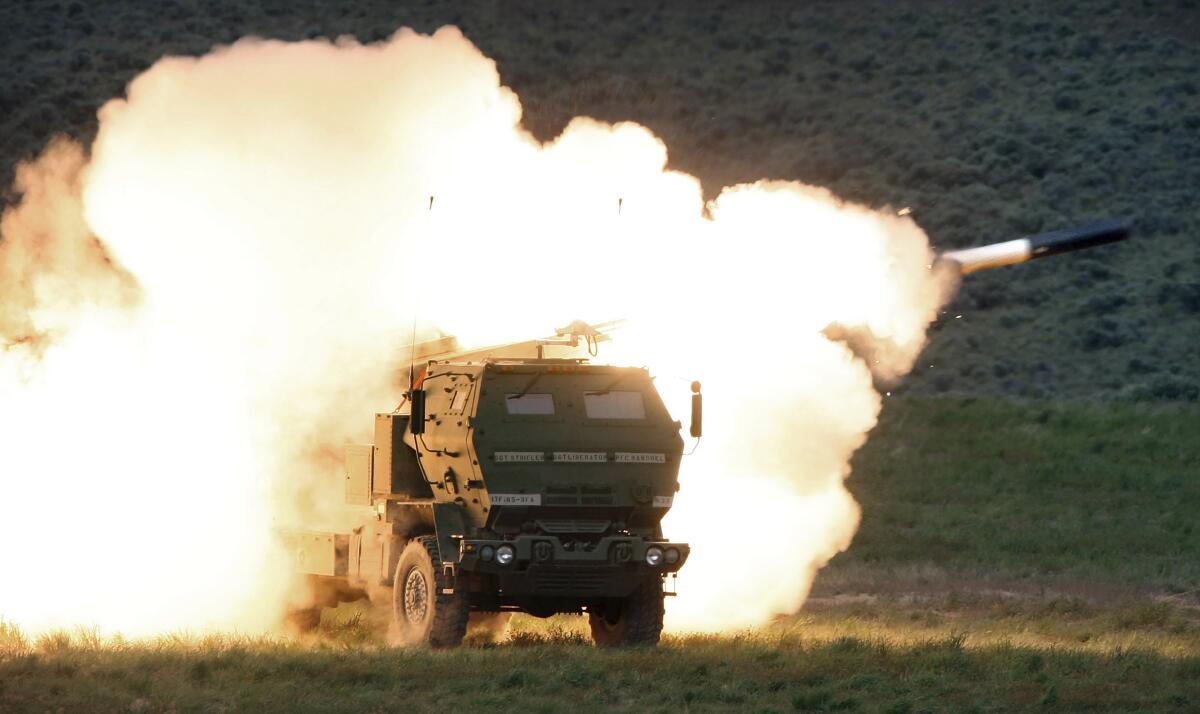White House announces $270-million military package for Ukraine

WASHINGTON — The White House announced Friday that the U.S. is sending an additional $270 million in security assistance to Ukraine, a package that will include additional medium-range rocket systems and tactical drones.
The latest tranche brings the total U.S. security assistance committed to Ukraine by the Biden administration to $8.2 billion and is being paid for through $40 billion in economic and security aid for Ukraine approved by Congress in May.
The new package includes four High Mobility Artillery Rocket Systems, or HIMARS, and will allow Kyiv to acquire up to 580 Phoenix Ghost drones — both crucial weapon systems that have allowed the Ukrainians to stay in the fight despite Russian artillery supremacy, according to John Kirby, the White House National Security Council’s coordinator for strategic communications. The latest assistance also includes some 36,000 rounds of artillery ammunition and additional ammunition for the HIMARS.
“The president has been clear that we’re going to continue to support the government of Ukraine and its people for as long as it takes,” Kirby said.
Ukrainian forces have used U.S.-made rocket launchers and tactical drones to destroy dozens of Russian targets and hold at bay Russia’s larger and more heavily equipped forces.
Russia can fire far more ammunition but has sustained huge losses of troops and equipment as Ukrainian forces have been equipped with precision weaponry from the U.S. and other Western allies. CIA Director William Burns on Wednesday said the U.S. estimates that 15,000 Russian forces have been killed. That would be equivalent to the Soviet Union’s military losses in its 1980s war in Afghanistan, which lasted nearly a decade.
To try to equalize the conflict, Ukraine has made ample use of Western-supplied technologies as it defends its eastern lines.
Ukraine has long sought more HIMARS launchers, which fire medium-range rockets and can be quickly moved before Russia can target them. On Wednesday, Ukrainian forces reportedly used one to hit a strategic bridge in the Russia-occupied southern region of Kherson. One military expert told the Associated Press that the systems have “hardly had any rest during the day or at night.”
U.S. authorities also are providing Ukraine with more guided rockets known as GMLRS. The Pentagon continues to rule out sending longer-range rockets that Ukraine could potentially use to strike deep into Russian territory; that’s a nod to the U.S. trying to manage the risk of Moscow instigating a broader war.
The U.S. has already sent 12 truck-mounted HIMARS to Ukraine. The United Kingdom has provided three launchers of a different kind, along with GMLRS rockets.
Both sides in the war have made ample use of drones. The U.S. had previously committed to sending 121 Phoenix Ghosts to Ukraine. Pentagon officials have not fully disclosed the capabilities of those drones, which were developed by the U.S. Air Force and produced by Aevex Aerospace, which describes itself as a leader in “full-spectrum airborne intelligence solutions.” The latest batch of Ghosts is expected to arrive starting in August.
The drones have onboard cameras and can be used to attack targets. Speaking to reporters Friday, a senior U.S. defense official declined to say how the Ghosts are used but said Ukraine had integrated drones into its battlefield approach “to great effect.” The official spoke on condition of anonymity under rules set by the Pentagon.
The U.S. disclosed earlier this month that it believes Russia is planning to obtain several hundred drones from Iran. Iranian drones have previously penetrated Saudi and Emirati air defense systems that were supplied by the U.S. Biden administration officials have tried to publicly discourage Iran from moving forward with the transfer.
The White House released satellite imagery indicating that Russian officials twice visited Iran in June or July for a showcase of weapons-capable drones Moscow is looking to acquire.
More to Read
Sign up for Essential California
The most important California stories and recommendations in your inbox every morning.
You may occasionally receive promotional content from the Los Angeles Times.








